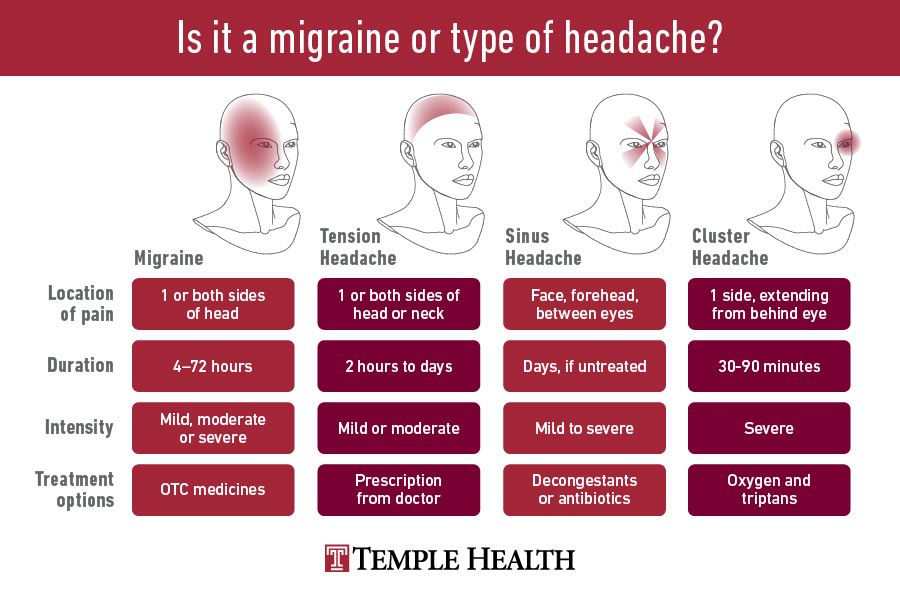Your forehead throbs and your eyes are painful and tired. It could certainly be a migraine, but it could also be a tension, sinus or cluster headache.
I’m a neurologist at Temple, so I get a lot of questions on this topic. My patients are also curious about the best treatments to alleviate or prevent their migraine or headache pain.
Today, I’m going to share with you 4 of the most common types of headaches, how you can tell the difference, and when to see your doctor.
When It’s Actually a Migraine
If you have a migraine, you may experience:
- An aura, or light haze, in the minutes before migraine pain appears
- Blurry vision
- Pain on one side of your head
- Light, touch, smell or sound sensitivity
- Nausea
Occasional migraines can be brought on by:
- Hormone fluctuations
- Stress
- Certain foods
- Lack of food or hydration
- Changes in the weather
In the case of a one-time migraine, your doctor may recommend over-the-counter medicines such as nonsteroidal anti-inflammatory drugs (NSAIDs) for pain relief.
When to See a Doctor
If you have ongoing migraines, your doctor will evaluate you for the cause of your migraine. You may be prescribed medicines to help prevent migraines from coming on.
Learn more about migraine triggers, symptoms and treatments available at Temple >

Tension Headache vs. Migraine
Tension headaches, which are brought on by emotional, mental or physical stress, are more common than migraines.
People who have tension headaches often complain of a band of pain across their forehead, or pressure on either side of the head. The pain is tiring, but not as severe as migraine.
Migraine, on the other hand, usually hurts worse on one side of the head. And, you may experience light sensitivity, aura, or bright lines or dots in your field of vision.
Tension headaches may resolve on their own once the source of stress is gone. In these cases, over-the-counter pain medications and lifestyle adjustments may help.
When to See a Doctor
If your tension headaches are chronic, or ongoing, I always tell my patients to err on the side of caution and schedule a visit. Depending on the severity and length of your symptoms, your doctor may prescribe medicines to prevent tension headaches from recurring.
Read more about tension headaches and how Temple doctors help patients get relief >
Sinus Headache vs. Migraine
Pain with a runny or stuffy nose is the typical symptom of a sinus headache. But did you know that a migraine can also cause these symptoms? The difference is in the color of your mucus:
- If your mucus is clear and runny, it could be a migraine.
- Sinus headaches can be a sign of a sinus infection that causes your mucus to thicken and sometimes turn a yellowish color.
When to See a Doctor
If you suspect you have a sinus headache and it’s not resolving, talk to your doctor. Sinus headaches are often treated with decongestants, antihistamines and sometimes antibiotics, if your headache is caused by a bacterial infection.
Cluster Headache vs. Migraine
Just like migraines, cluster headaches affect one side of the head and are incredibly painful.
But unlike migraines, cluster headaches come on suddenly with a piercing pain that feels like someone stabbed you in the eye or temple with a knitting needle. Cluster headaches can also result in a stuffy nose and teary eyes.
Migraine pain usually starts with some type of signal, such as a flashing light in your visual field or a light aura. While cluster headaches can resolve quickly (within a few hours), migraines can last for days.
When to See a Doctor
If you think you’re experiencing cluster headaches, talk with your doctor about fast-acting treatments. These include oxygen and triptans, which may be injected or taken as a nasal spray. Steroids and nerve blocks may also be an option if you have ongoing cluster headaches.
What to Know Before You See the Doctor
Some people think an occasional headache is nothing to worry about. But headaches can become a problem if:
- You experience them frequently
- They become severe
- They are disrupting your everyday life
To help your doctor diagnose the source of your headaches, I find it useful when my patients keep track of how often they’re happening. This way, I can determine whether there’s a pattern in triggers.
Learn what may be causing your headaches >
Seek immediate care for your headache if you experience:
- A sudden, intense headache
- Loss of consciousness or vision
- Frequent vomiting
- Pain for more than 72 hours with little to no relief
If you’d like to speak with a Temple doctor about your headaches, schedule an appointment or call 800-TEMPLE-MED (800-836-7536) today.


